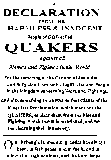The Quaker Peace Testimony
"We utterly deny all outward wars and strife and fightings with outward weapons, for any end, or under any pretence whatsoever; and this is our testimony to the whole world. The spirit of Christ, by which we are guided, is not changeable, so as once to command us from a thing as evil and again to move unto it; and we do certainly know, and so testify to the world, that the spirit of Christ, which leads us into all Truth, will never move us to fight and war against any man with outward weapons, neither for the kingdom of Christ, nor for the kingdoms of this world."Declaration of Friends to Charles II, 1660
Early Quaker Statements
Isaac Penington on the Magistrate's Sword, 1661
George Fox on "Keeping Watch," 1676
A Declaration to Charles II 1660 This is the entire text of what most believe is the seminal statement of the Quaker peace testimony. A Declaration from the harmless and innocent people of God, called Quakers, against all plotters and fighters in the world, for the removing the ground of jealousy and suspicion from both magistrates and people in the kingdom, concerning wars and fightings.
In this memoir, "Divine Protection," Friend Dinah Goff recounts how she and her family coped with being targeted for slaughter in the bloody Irish Rebellion of 1798.
The Resurrection of John Lilburne 1655
George Fox, commonly described as the Founder of Quakerism, wrote of war in 1651
Robert Barclay, the premier Quaker theologian, wrote of war in 1678
From A Letter Issued by London Yearly Meeting 1744,
During the War of the Austrian SuccessionIssued by Yearly Meeting 1804, 1805, during the Napoleonic Wars
From an Epistle Issued by London Yearly Meeting 1854, during the Crimean War
"Example and Testimony of the Early Christians on the Subject of War" Jonathan Dymond (1796-1828), (excerpted from Dymond's book on war and Christianity)
"The Fighting Sailor Turn'd Peaceable Christian" Thomas Lurting (17th century), (An autobiographical account, featuring his conversion and an encounter with pirates handled nonviolently.)
First Among Friends A description of the origins and emergence of the peace testimony is in this essay by historian H. Larry Ingle, author of First Among Friends, the standard biography of George Fox.
Roots of Quaker Non-Violence within the Puritan Reformation John Yoder. chapter six in Chapters in the History of Religiously Rooted NonViolence: A Series of Working Papers of the Joan B. Kroc Institute for International Peace Studies.
Contemporary Quaker Statements
Peace Testimony - Statement from the U.K.
Friends (Quakers) and Peace article by Bill Samuel
Friends Peace Testimony in World War I An FGC pamphlet from 1917
The Integrity of German Friends During the Twelve Years of Nazi Rule
A Pendle Hill Lecture By Brenda BaileyThe Biblical Basis of Peacemaking by Ron Mock, Center for Peacemaking, George Fox University
From an Epistle Issued by Yearly Meeting 1943
London Yearly Meeting, during the Second World WarFrom an Epistle Issued by Yearly Meeting 1915
London Yearly Meeting, during the First World WarFrom an Epistle Issued by Yearly Meeting 1900
London Yearly Meeting, during the South African WarSome Quaker Reflections on the Kosovo War, by Chuck Fager
Blessed are the Peacemakers Don Green, 1980
New Zealand Statement on Peace 1987
Quaker Peace Testimony and the Nobel Peace Prize Irwin Abrams, 1991
Understanding the Peace Testimony (Philadelphia Yearly Meeting Resources for Those Laboring with Issues of Our Peace Witness in the Aftermath of the Events of September 11th
Peace Testimony & Modern Quakerism Allen Smith
Resources
Movies on War and Peace recommended by Quakers
The International Historic Peace Church Consultation "Theology and Culture: Peacemaking in a Globalized World" at Bienenberg Theological Seminary, Switzerland, June 25-29, 2001
The War Prayer by Mark Twain, 1905 Outraged by American military intervention in the Philippines, Mark Twain wrote this and sent it to Harper's Bazaar. This women's magazine rejected it for being too radical, and it wasn't published until after Mark Twain's death, when World War I made it even more timely. It appeared in Harper's Monthly, November 1905
Links assembled by Dennis W. Mills
"An eye for an eye only makes the whole world blind." - Mohandas Gandhi
